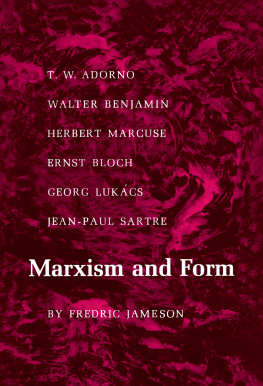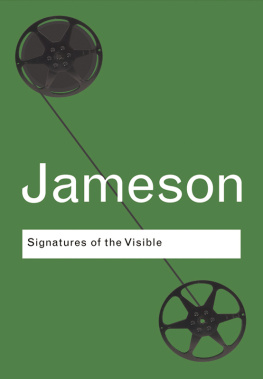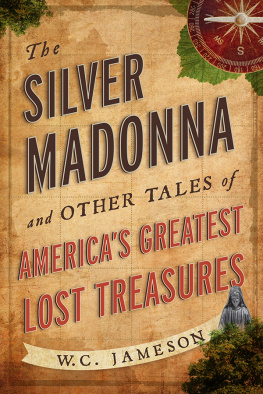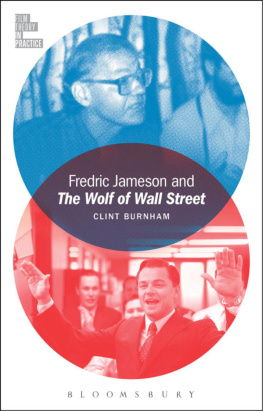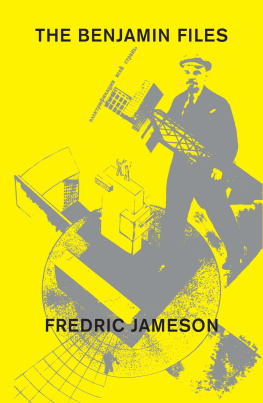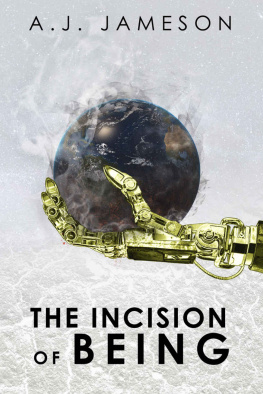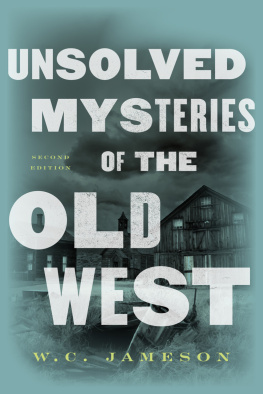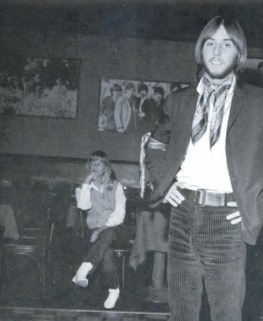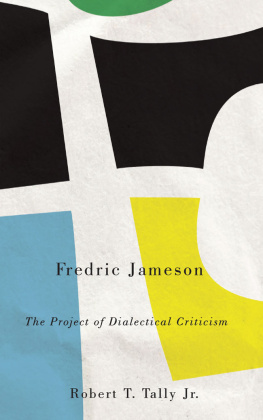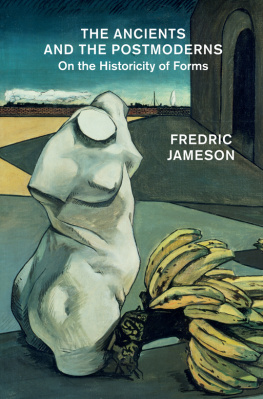Jameson - 1974;2006;
Here you can read online Jameson - 1974;2006; full text of the book (entire story) in english for free. Download pdf and epub, get meaning, cover and reviews about this ebook. City: Princeton;N.J, year: 1974;2006;2016, publisher: Princeton University Press, genre: Religion. Description of the work, (preface) as well as reviews are available. Best literature library LitArk.com created for fans of good reading and offers a wide selection of genres:
Romance novel
Science fiction
Adventure
Detective
Science
History
Home and family
Prose
Art
Politics
Computer
Non-fiction
Religion
Business
Children
Humor
Choose a favorite category and find really read worthwhile books. Enjoy immersion in the world of imagination, feel the emotions of the characters or learn something new for yourself, make an fascinating discovery.
1974;2006;: summary, description and annotation
We offer to read an annotation, description, summary or preface (depends on what the author of the book "1974;2006;" wrote himself). If you haven't found the necessary information about the book — write in the comments, we will try to find it.
1974;2006; — read online for free the complete book (whole text) full work
Below is the text of the book, divided by pages. System saving the place of the last page read, allows you to conveniently read the book "1974;2006;" online for free, without having to search again every time where you left off. Put a bookmark, and you can go to the page where you finished reading at any time.
Font size:
Interval:
Bookmark:

Marxism and Form
TWENTIETH-CENTURY DIALECTICAL THEORIES OF LITERATURE
Marxism and Form
TWENTIETH-CENTURY DIALECTICAL THEORIES OF LITERATURE
BY FREDRIC JAMESON
PRINCETON, NEW JERSEY
PRINCETON UNIVERSITY PRESS
Copyright 1971 by Princeton University Press
ALL RIGHTS RESERVED
L.C. Card: 71-155962
ISBN: 0-691-01311-X (paperback edn.)
ISBN: 0-691-06204-8 (hardcover edn.)
First Princeton Paperback Edition, 1974
Second Hardcover Printing, 1974
Publication of this book has been aided
by a grant from the Whitney Darrow Publication Reserve Fund of Princeton University Press
This book has been composed in Linotype Caledonia
Princeton University Press books are printed on acid-free paper and meet the guidelines for permanence and durability of the Committee on Production Guidelines for Book Longevity of the Council on Library Resources
Printed in the United States of America
18 17 16 15 14 13 12
Il nexiste douvert la recherche mentale que deux voies, en tout, o bifurque notre besoin, savoir, lesthtique dune part et aussi lconomie politique.
Mallarm
Intelligent idealism is closer to intelligent materialism than is unintelligent materialism.
Lenin
CONTENTS
PREFACE
WHEN THE American reader thinks of Marxist literary criticism, I imagine that it is still the atmosphere of the 1930s which comes to mind. The burning issues of those daysanti-Nazism, the Popular Front, the relationship between literature and the labor movement, the struggle between Stalin and Trotsky, between Marxism and anarchismgenerated polemics which we may think back on with nostalgia but which no longer correspond to the conditions of the world today. The criticism practiced then was of a relatively untheoretical, essentially didactic nature, destined more for use in the night school than in the graduate seminar, if I may put it that way; and has been relegated to the status of an intellectual and historical curiosity, as which, in the form of an occasional stray reprint of an essay by Plekhanov or a passing reference to Christopher Caudwell, it is presently maintained.
In recent years, however, a different kind of Marxist criticism has begun to make its presence felt upon the English-language horizon. This is what may be calledas opposed to the Soviet traditiona relatively Hegelian kind of Marxism, which for the German countries may be traced back to the theoretical excitement of Lukcs History and Class Consciousness in 1923, along with the rediscovery of Marxs Economic and Philosophical Manuscripts of 1844; while in France it may be most conveniently dated from the Hegel revival there during the late thirties.
I would be well pleased if the chapters that follow were found useful as a general introduction to that Marxism and to some of its principal theoreticians. I have in particular tried to give a full account of some of its key worksLukcs Theory of the Novel as well as his History and Class Consciousness, Blochs Hope the Principle, Benjamins Origins of German Tragedy, Adornos Philosophy of the New Music and Negative Dialectics, Sartres Critique of Dialectical Reasonwhich have been, at worst, inaccessible to the English-language reader and, at best, little discussed here.
Even such a relatively modest and straightforward task as this is, however, a whole program in itself: for one thing, even the better-known writers such as Sartre or Lukcs have never come into focus clearly in English on account of the anti-Communist bias of their commentators, or often simply on account of the absence of any genuine Marxist culture in academic circles.
Less obvious, perhaps, is the degree to which anyone presenting German and French dialectical literature is forcedeither implicitly or explicitlyto take yet a third national tradition into account, I mean our own: that mixture of political liberalism, empiricism, and logical positivism which we know as Anglo-American philosophy and which is hostile at all points to the type of thinking outlined here. One cannot write for a reader formed in this traditionone cannot even come to terms with ones own historical formationwithout taking this influential conceptual opponent into account; and it is this, if you like, which makes up the tendentious part of my book, which gives it its political and philosophical cutting edge, so to speak. For the bankruptcy of the liberal tradition is as plain on the philosophical level as it is on the political: which does not mean that it has lost its prestige or ideological potency. On the contrary: the anti-speculative bias of that tradition, its emphasis on the individual fact or item at the expense of the network of relationships in which that item may be embedded, continue to encourage submission to what is by preventing its followers from making connections, and in particular from drawing the otherwise unavoidable conclusions on the political level. It is therefore time for those of us in the sphere of influence of the Anglo-American tradition to learn to think dialectically, to acquire the rudiments of a dialectical culture and the essential critical weapons which it provides. I would be gratified if this book contributed even in a small way to such a development.
What follows is, however, not philosophy but literary criticism, or at least a preparation for literary criticism. The stress Marx laid on individual works of art and the value they had for him (as for Hegel before him and Lenin after) were very far from being a matter of personality: in some way, which it is the task of Marxist theory to determine more precisely, literature plays a central role in the dialectical process. I might also add that the closed realm of literature, the experimental or laboratory situation which it constitutes, with its characteristic problems of form and content and of the relationship of superstructure to infrastructure, offers a privileged microcosm in which to observe dialectical thinking at work.
At the same time, if the chapters that follow do not present any of the rigor of technical philosophical investigation, their status as language remains ambiguous: for they are also far from being simplified introductory sketches, or journalistic surveys of the various positions and key ideas of a writer, anecdotal narratives of his situation and his relationship to the problems of his time. Not that these things are uninteresting or without their usefulness; but from my point of view, they remain on the level of sheer opinion only, which is to say of intellectual attitudes seized from the outside. I have felt that the dialectical method can be acquired only by a concrete working through of detail, by a sympathetic internal experience of the gradual construction of a system according to its inner necessity. Nor have I attempted to reconcile these various constructions in the course of presentation; rather, in a final section, I have tried to describe the process of dialectical thinking in general, and the ways in which it can deal with literature in particular.
I should say something about the difference in emphasis between the German and the French chapters. From the point of view of the nondialectical Anglo-American tradition both modes of thought are equally exciting, equally liberating, but in different ways. It is worth pointing out that in Germany dialectical thinking has always been an official, it not the official, philosophical tradition: only recently again, the triumph of Adorno over Heideggerian existence-philosophy marked the renewal of the schools with that tradition after the long darkness of the Hitler period.
Next pageFont size:
Interval:
Bookmark:
Similar books «1974;2006;»
Look at similar books to 1974;2006;. We have selected literature similar in name and meaning in the hope of providing readers with more options to find new, interesting, not yet read works.
Discussion, reviews of the book 1974;2006; and just readers' own opinions. Leave your comments, write what you think about the work, its meaning or the main characters. Specify what exactly you liked and what you didn't like, and why you think so.

